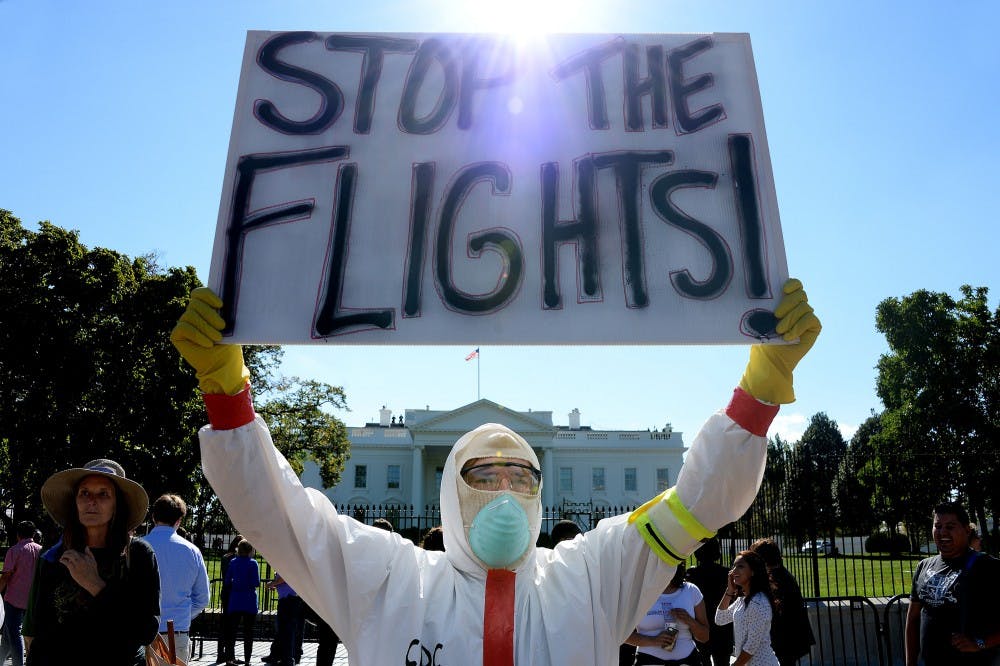
Lauren Chapman is a senior journalism news and telecommunications major and writes ‘Miss Know-It-All’ for The Daily News. Her views do not necessarily agree with those of the newspaper. Write to Lauren at lechapman@bsu.edu.
Ebola is scary. Your eyes and gums can start bleeding, and you poop to death. I’m pretty sure if the mortality rate for Ebola wasn’t so high, it would be a villain in the “Captain Underpants” series.
Within the past month, three people have been infected in the United States. Two nurses caught Ebola from a Liberian man who died from the virus in Texas.
DAILY NEWS: Ball State Health Center creates Ebola protocol
With an Ebola Czar appointed by President Barack Obama and the Center for Disease Control and Prevention approaching the infected like it’s a zombie outbreak, there is a lot of misinformation about an otherwise straightforward disease.
Since the first diagnosis of Ebola in the United States, people have been on high alert. A woman in Washington, D.C., threw up in a Pentagon parking lot and was descended on by a swarm of Marines in hazmat suits.
Even the Transportation Security Administration agent who dealt with Amber Vinson, the second Dallas nurse to contract Ebola, has been put on leave as a precaution, despite wearing gloves while patting down a symptom-less Vinson.
Not every person throwing up in the street has Ebola. So, let’s put down the hazmat suits and realize that Ebola probably isn’t going to kill you.
Mass media has cultivated a culture of fear over Ebola, despite only have eight confirmed cases in the United States – all of them connected directly to missionary work or Thomas Eric Duncan, the first person in the U.S. to be diagnosed with Ebola.
EBOLA IS NOT MYSTERIOUS
Ebola has been around since Gerald Ford was president of the U.S., 40 years ago. In fact, the virus is named after the Ebola River in the Democratic Republic of the Congo, where it was first documented in 1976. That initial outbreak killed 88 percent of the infected, with 280 people dead. The simultaneous outbreak in Sudan killed 151 people.
The World Health Organization said the average Ebola fatality rate is around 50 percent, but ranges from 25 to 90 percent, depending on the outbreak. We know a lot about how Ebola is transmitted and what it does to people. The problem is not that Ebola is mysterious, but because in the past it only affected African countries.
Every outbreak of Ebola has occurred in a West African country since it first appeared in 1976. Pharmaceutical companies can’t make a lot of money off of a vaccine, which is why we don’t have an established treatment or vaccine for Ebola.
Ebola is a virus. If you treat the symptoms, you can normally treat the patient. Vomiting and diarrhea dehydrate the body. Internal and external bleeding, impaired kidney and liver function are the reasons you die. The symptoms kill you, not the virus.
YOU’RE PROBABLY NOT GOING TO GET EBOLA
Unlike the common cold, currently, Ebola can only be spread through contact with human waste or fluid, as opposed to through the air. The World Health Organization said this outbreak of Ebola has been the result of human to human transmission.
In the first outbreak, 40 years ago, the transmission was blamed on African fruit bats.
I don’t personally touch a lot of human waste or fluid. Unless you’re a medical professional or one of the 8.5 nurses per 1,000 people in the U.S., you’re not likely to get Ebola, even if the virus spreads out of Texas.
Moreover, you can only get Ebola if you touch human waste or fluid of someone displaying symptoms of Ebola. People with “vomiting, diarrhea, rash, symptoms of impaired kidney and liver function” are not normally people you bear hug on the street.
The 75 staff members that came in contact with Duncan have been urged to sign a legal agreement to avoid public transportation and large crowds while they are in the 21-day incubation period of Ebola.
Duncan’s family members were under quarantine (and armed guard) since the end of September. After Oct. 19, they were out of the incubation period and released from quarantine. And so far, none of them showed symptoms of the disease.
Even with Vinson, one of two nurses who contracted Ebola, traveling in an airplane to Ohio, the CDC is fairly confident that the passengers are okay. Confident enough, in fact, said a CDC spokesperson, the organization gave her the okay to fly back to Texas after reporting a low-grade fever.
There have been eight confirmed cases of Ebola treated in the United States. Duncan, who traveled from Liberia, was the first death. He died on Oct. 8.
That being said, in the highly unlikely event the spread of Ebola gets any worse in the United States, be safe. This is the worst Ebola outbreak yet. Since December 2013, more than 4,500 people have died from the virus.





